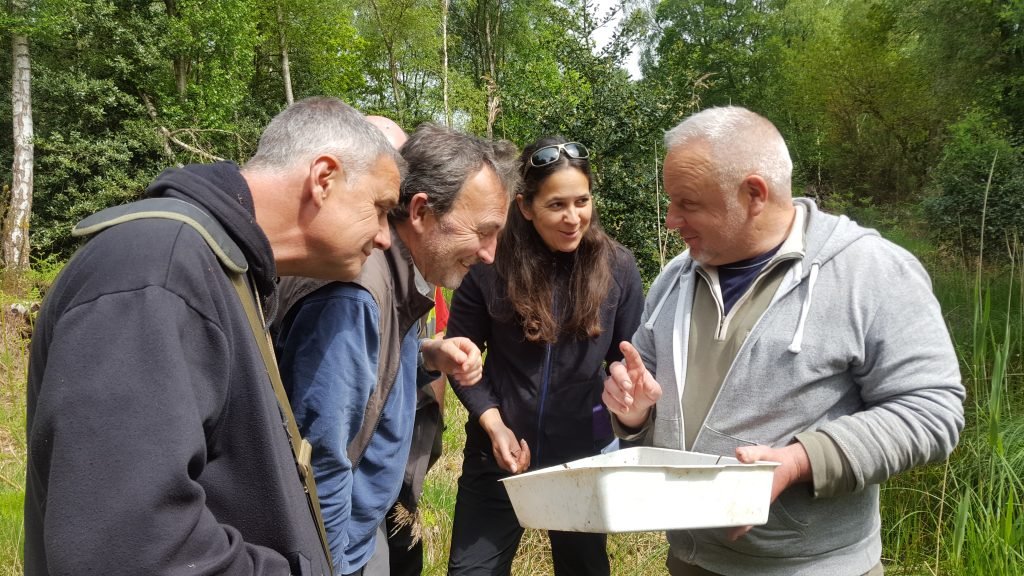Protecting and Connecting Stow Bedon Common: June 2018
19th June 2018
Freshwater Habitats Trust is delighted to have been awarded a grant of almost £32,000 by Biffa Award to help protect one of Norfolk’s most important yet little known freshwater sites.
Stow Bedon Common in Breckland is home to over 30 natural ponds known as pingos, created over 12,000 years ago by ground-ice thawing during the last Ice Age, leaving behind shallow depressions which filled with water. Free from pollution, these ponds are now exceptionally rich in freshwater life and are home to many rare plants and animals, but they need help to stay that way.
Over the next year the grant from Biffa Award will pay for clearing scrub and putting in new fencing so that livestock can graze the site. The grazing animals will keep the ponds in perfect condition for the special plants and animals that live there by stopping the growth of trees and scrub.
Freshwater Habitats Trust will also be supporting local people to become guardians of the site. The Trust will be running training events and practical work sessions, creating a resource of volunteers to continue caring for the site long into the future.

Stow Bedon Common’s ponds are home to an impressive range of water beetles, numerous dragonflies and damselflies, and uncommon water plants like the carnivorous Bladderwort. The site is also home to Norfolk’s only known population of Pond Mud Snail, a species which has declined sharply throughout the UK and is now a priority for conservation. Very little was known about this ancient site when Freshwater Habitats Trust first began working here 3 years ago. Since then, the Trust has revealed just how important these ponds are.
Freshwater Habitats Trust Project Officer Pete Case said, “I am delighted to be able to do more to care for the wildlife at this exceptional site. The grant from Biffa Award has made it possible to keep these ponds in great condition.”
Biffa Award, a multi-million pound fund that helps to build communities and transform lives through awarding grants to communities and environmental projects across the UK.
Gillian French, Head of Grants said, “So many species call these ancient, natural ponds home and it is fantastic to be able to conserve such an important site. It’s brilliant to see the area in safe hands and we can’t wait to see how these habitat rich areas develop.”
Freshwater Habitats Trust is also grateful to Stow Bedon Fuel Allotment Charity for their support, and the True and Fair Foundation for their financial contribution to this project.
If you would like to learn more about this project, or are based locally and would like to help, please contact Project Officer Pete Case on pcase@freshwaterhabitats.org.uk.
Notes to editors
- Freshwater Habitats Trust is the only UK charity focusing on the conservation of our wonderful freshwater habitats and the wildlife they support. We have been celebrating freshwater wildlife for 30 years, and continue protect freshwater wildlife for everyone to enjoy.
- Biffa Award: Since 1997, Biffa Award has awarded grants totalling more than £165 million to thousands of worthwhile community and environmental projects across the UK. The programme administers money donated by Biffa Group Ltd through the Landfill Communities Fund.
- Landfill Communities Fund: The Landfill Communities Fund (LCF) is an innovative tax credit scheme enabling operators (LOs) to contribute money to organisations enrolled with ENTRUST as Environmental Bodies (EBs). EBs use this funding for a wide range of community and environmental projects in the vicinity of landfill sites. LOs are able to claim a credit (currently 5.3%) against their landfill tax liability for 90% of the contributions they make. Since its inception in 1996, over £1.6 billion has been spent on more than 56,000 projects across the UK. For further information please visit entrust.org.uk or see HMRC’s general guide to landfill tax.
- Stow Bedon Common, owned by Stow Bedon Fuel Allotment Charity, is a Flagship Pond site – one of the most important pond sites in the country. Read more about Stow Bedon Common.
- Earlier this century, Pond Mud Snails (Omphiscola glabra) were widespread but in recent years they have declined significantly. They still have some strongholds in Yorkshire, Cheshire, the New Forest and the West Country, however they may even be declining in these areas. The Pond Mud Snail is very uncommon in East Anglia; Stow Bedon Common is the only site known to support it in Norfolk. Find more information about Pond Mud Snails.
19th June 2018
